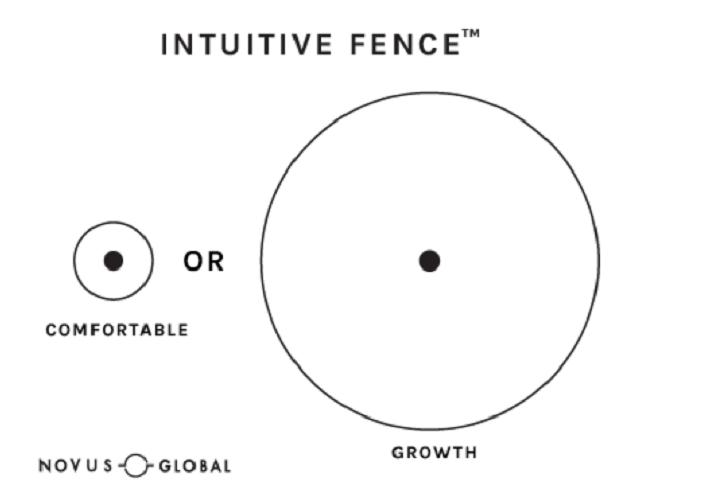Intuitive Fences Part 2: Going Beyond Comfort by Coaching a Growth Mindset & Goal Setting
In Part 1 of our “Intuitive Fences” article, we discussed the fundamental challenge of leadership: underestimating yourself and your people. We learned about the “Intuitive Fence”™, inside of which we believe goals are possible and outside of which we believe they are not. And we discussed how easy it is for people to become defensive when challenged to do something they believe is impossible.
Today we’re going to look at coaching a growth mindset by lifting people out of the trap of their defensive tendencies and creating a growth mindset culture that leads to practical, effective growth mindset goal-setting.
Our Intuitive Fences aren’t usually rooted in fact. They’re not “Fact Fences”; they’re “Intuitive Fences.” This means they’re rooted in intuition. And our intuition is powerfully shaped by emotion. Specifically: the desire to be right mixed with the desire to be comfortable. Creating a growth mindset culture begins with challenging this desire for comfort and disciplining our intuition into something that better serves our potential.
Coaching a growth mindset is one of the most important things you can do to build effective leadership in yourself and your coaching clients.
Have you ever tried to convince someone that something they thought was unrealistic was actually possible?
On Being Wrong and Comfortable
What does it feel like to be wrong? While it may not seem like it at first, this is ultimately a question about coaching a growth mindset. We love asking this question during our trainings with companies. People give answers that usually sound like this: embarrassed, ashamed, bad or sometimes excited, humbling, maybe an opportunity to grow, etc.
What’s so interesting is that this is not how you feel when you’re wrong. That’s how you feel when you realize that you’re wrong. How do you feel when you’re wrong but haven’t realized it yet?
It feels exactly like being right. Being wrong feels like being right, until of course you realize that you’re wrong. In order to expand our Intuitive Fences, we need to improve at coaching a growth mindset. We need to develop a humble curiosity around our perceptions of ourselves, our teams, and the world around us—especially when it comes to more accurately evaluating our capabilities. Effective growth mindset goal-setting depends on having a more reliable awareness of reality.
The same is true for comfort. The smaller our Intuitive Fences are, the more comfortable we’re allowed to be. Put another way: the less we’re capable of, the less we need to try. The less we’re capable of, the less people expect from us. If we want to be creating a growth mindset culture that will truly deliver results, we need to be willing to put in the work—not the busywork of keeping up on reports and e-mail, but the growth mindset goal-setting work of methodically questioning your beliefs and processes to support the fulfillment of difficult or “counterintuitive,” but still entirely-possible goals. And coaching a growth mindset successfully means talking people out of “the comfortable road.”
So, people tend to enjoy having smaller Intuitive Fences because it’s more comfortable, and then they love to be right about it. In order to expand our Intuitive Fences, we have to become comfortable with being intentionally uncomfortable.
This is the reality of leadership: Coaching a growth mindset begins with preparing people, explicitly, to become uncomfortable. Growth mindset goal-setting inherently involves goals that push us beyond what we currently are, and force us to see possibilities that we currently do not believe are possible. It’s not easy.
The smaller the Intuitive Fences are for people, the harder it is to lead them. And if a leader has a smaller Intuitive Fence than the people following her, the followers will leave or cause problems. Creating a growth mindset culture begins with the leader.
The key objective then for any leader in coaching a growth mindset is to identify and challenge and grow their own Intuitive Fence and to create cultures where people not only challenge and grow their own fences but actually want their leaders to challenge their fences.
Have you ever had someone try to tell you that something you were convinced is impossible is actually possible?
The Intuitive Fence and Your Vision
So, what does this have to do about the future?
Well, it’s about coaching a growth mindset. With rare exception, people tend to live only into futures that they think are possible. Put another way, people tend to live only into futures that can fit inside their Intuitive Fence. Most people’s visions for their future are inside their Intuitive Fence.
This is why the spiritual activist, Paul of Tarsus, wrote in his letter to people in Ephesus 2,000 years ago that The Divine is able to do more than we can “ask or imagine” (Ephesians 3:20). What Paul was saying is that The Divine lives outside our Intuitive Fence, and to connect to The Divine in a significant way is to have our Intuitive Fences expanded.
The bigger your Intuitive Fence gets, the more you’ll expect from yourself and those around you. And the more you expect from the future and yourself, the more you’ll rally to create it, and the better you’ll become at coaching a growth mindset. The more you assume you’re capable of, the more likely you are to try and nurture and refine that capability. The more you assume your team is capable of, the more likely you are to ultimately lead them to unprecedented heights.
The hardest part of creating a growth mindset culture is the early stage of questioning your beliefs about what you and your team are capable of. Once you begin to realize just how easily “the impossible” melts away, the actual work of growth mindset goal-setting almost handles itself.
How Big Is Your Intuitive Fence?
So, let me ask you: How big is your Intuitive Fence? How big is your team’s? What are you currently doing to expand your own fence, and how are you helping your team members expand their own fences? How are you coaching a growth mindset?
Creating a growth mindset culture and sticking to it ultimately leads to creating wild and audacious achievements that your older self would never have dared to try. As teams begin to collectively grow their Intuitive Fences, they will instinctively create better futures fit for living in. And the future you anticipate will not only grow, but will be worthier of your pursuit and more likely to happen.


